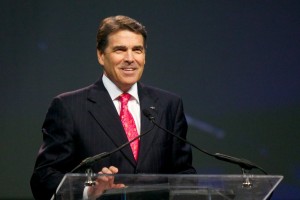Which GOP Candidate’s Faith Is Really Under Attack?

It’s been an arduous month on the campaign trail for presidential hopeful Rick Perry – at least, according to his wife, Anita. And she has little doubt as to why. Speaking to voters in South Carolina, she explained, “We are being brutalized by our opponents, and our own party. So much of that is, I think, they look at him because of his faith.”
Religion has been a hot topic throughout the campaign season, perhaps because it matters to voters, and especially to Republican voters. A PRRI survey from earlier this summer revealed that a majority (56%) of the public – and more than 7-in-10 Republicans (71%) and Tea Party-identifiers (72%) – agree that it is very or somewhat important for a presidential candidate to have strong religious beliefs, regardless of whether those beliefs are the same as their own.
It’s true that Rick Perry has been especially open about his own religious beliefs, even headlining a Christian prayer summit in Houston just days before he launched his campaign. But the candidate whose religious background has been under particular scrutiny over the past few weeks is Mitt Romney. At the Values Voter Summit earlier this month, an evangelical pastor named Robert Jeffress announced his support for Perry by suggesting that other candidates (i.e., Romney and Jon Huntsman, the two Mormons in the race) were not Christians.
The one advantage for Jon Huntsman (who has been consistently polling around 1 percent nationally) is that it has granted him a certain amount of freedom to express his views, particularly when the topic is about his faith. As the front-runner, Romney has been more constrained. He asked Perry to reject Jeffress’ claims, which Perry declined to do. A recent New York Times story shows just how deeply invested Romney is in his church, although unlike Perry, Romney is not as apt to speak about his faith publicly.
One result of Romney’s decision not to make his faith a central part of his campaign is that few Americans are aware about his faith. In July, 43% of Americans thought that Romney’s religion is somewhat or very different than their own, while 22% said his religion is somewhat or very similar to their own, and 31% said they don’t know what his religious beliefs are. Rick Perry had not yet stepped into the ring when the survey was conducted, but when asked about George W. Bush, another evangelical Christian (and former Texas governor), Bush scored highest in perception of religious similarity compared to Romney, Barack Obama, and Michele Bachmann.
Of course, it’s hard to know whether Americans’ views about a candidate’s faith will translate into votes. But it seems that of the two candidates, Romney has more of an uphill battle in convincing the American people to accept (or understand) his faith than Rick Perry. A recent report from the Pew Research Center adds another dimension: media coverage. Overall, Rick Perry has actually been getting the most favorable coverage, although in the past few weeks he’s been outstripped by Herman Cain – who’s just beginning to talk about his religious convictions.

